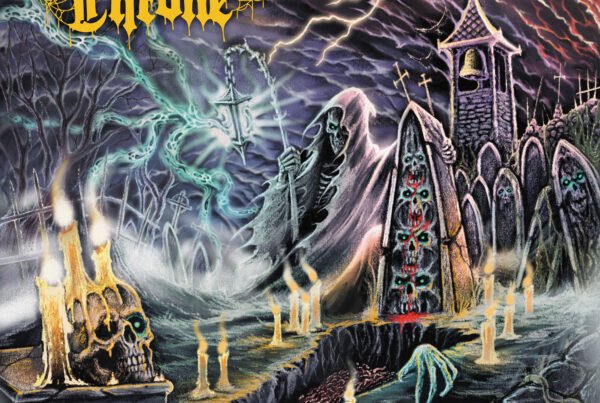On Miss Anthropocene, Grimes commands an arsenal of styles, welding them into an opus of her own that is a simultaneously play- and thoughtful reflection on grief, loss, and an uncertain future.
My introduction to Grimes came late, namely with the release of her acclaimed 2015 album Art Angels. It was a fun, exceptionally well-produced, and quirky take on pop – driven by acoustic power-strumming set to processed beats, in a manner akin to some bizzaro revamp of britpop and post-grunge of the late 90s. Shortly after, I discovered Grimes had been around for a while, her sci-fi-inflected discography of experimental electronic pop music stretching back to 2010. She had come a long way since then, upping her skills as a producer and writer in impressive increments.
It’s been a lengthy five years since the release of Art Angels, and for an eclectic and swirling creative force like Grimes, ‘where next’ is inevitably a confounding question.
As it turns out, ‘where next?’ is Miss Anthropocene, her fifth studio album. She’s described it at various points in the press as ‘ethereal nu-metal(ish)’ and – more intriguingly – as an album about ‘the anthropomorphic Goddess of climate Change: A psychedelic, space-dwelling demon/beauty-Queen who relishes the end of the world.‘ All signs seemed to point towards a darker, more aggressive direction than what was explored on Art Angels. It’s worth noting that several singles were released in the build up to this album’s release, approximately a full half of the ten-track album. Prior to diving in for this review, I had managed to stay clear of each one of these singles, and my experience was likely elevated for it. The album is stylistically cohesive, but there are some truly brilliant surprises I was happy to discover for myself along the way.
While Miss Anthropocene is indeed darker than Art Angels, and perhaps the darkest work in Grimes’s discography, I would hardly describe it as a ‘dark’ album. To me, that label conjures up something incredibly specific – an undercurrent of menace, with tonal potency that explicitly suggests violence and impure deeds. With the exception of the tracks “Darkseid” (with its threatening buzzsaw synths and sinister trap beats) and “My Name Is Dark” (with its ominous notes slithering between taunting vocals), darkness – as I personally define it – isn’t particularly present here.
Thematically and musically, I find myself drawn to the word ‘sorrowful’ as a more appropriate descriptor. There is a deep sense of loss and sadness running through these ten tracks, masked to varying degrees by upbeat pop, big beat, and ethereal beauty. It’s there all the same, whether in “Delete Forever”‘s reflections on the American opioid crisis – by far the album’s most poignant moment, and strongest stylistic link to Art Angels by virtue of its prominent acoustic guitar – or “Before the Fever”’s aching crooning and languid, washed-out liquid dubstep-meets-trip-hop breakbeats: grief always feels close by. My listening experience was punctuated by regular feelings of malaise in the best possible way, and I attribute this to Grimes’s confidence in reflecting the album’s apocalyptic themes and tragic production in all facets of the music.
However, the album is far from a one-note affair. Grimes utilizes an impressive range of vocal styles, including but not limited to technically proficient pop singing, her signature infantile alien squeak (this is a compliment), and a range of effect-laden voices that all communicate different moods. While Miss Anthropocene is generally rooted in downtempo ambience, the arrangements are mixed up regularly enough that the songs retain unique identities while still feeling very much like a part of the album. This is an experience designed for the listener to get lost in, expertly retaining enough multifaceted elements and flexibility for the individual tracks to work as either stand-alone singles or material to be remixed into something else. Here we have the finest songwriting of Grimes’s career so far, and her epic conceptual vision shines through brightly in the results.
I remember alluding to some surprises along the way. For me, they arrived in the form of “4ÆM,” a track brimming with bright, propulsive drum’n’bass energy that hit me unexpectedly hard. It’s this single in particular that I’m glad to have avoided hearing beforehand, as it’s such an exemplary display of a sound seldom heard in today’s music that hearing it for the first time in the context of the album elevated my appreciation of Miss Anthropocene as a whole exponentially. “4ÆM” is the kind of track peak Pendulum pulled off so well: something out of a high-octane racing game soundtrack, evoking a sleek, speeding craft on an alien world, gaining momentum ever upward into a bright blue ethereal plane. No other track on Miss Anthropocene comes close to having such an effect on me, but given the overall quality and variety of genres and moods on display, I have no doubt listeners will be struck by similar feelings of exhilaration at some point during their listening experience.
Miss Anthropocene is probably destined for a spot on my best of 2020 list. It’s finely tuned crossover electronic music that appeals to a wide spectrum of listeners, including fans of pop, industrial, goth, drum’n’bass, and downtempo. More importantly, it is a distinct piece of art immediately recognizable as Grimes’s, and the finest work of her career so far. The sheer level of detail, immersion, purpose, and originality makes the record stand above its peers. Supposedly, a follow-up album is already in the works, and if it continues to evolve the quality on display here, Grimes’ dominion over this style of the music looks set to remain uncontested for a very long time.






